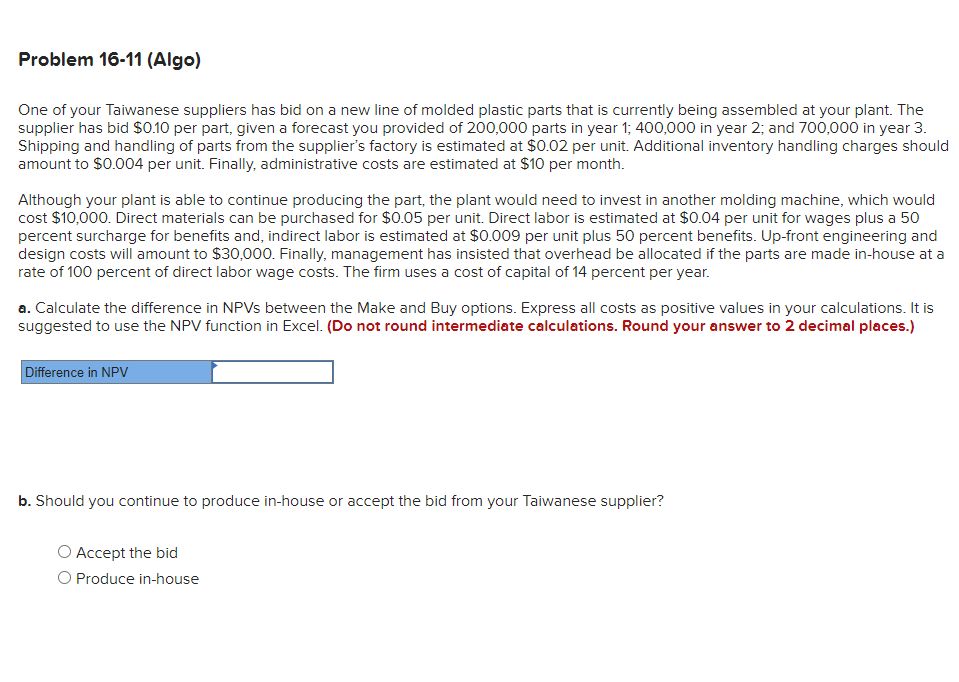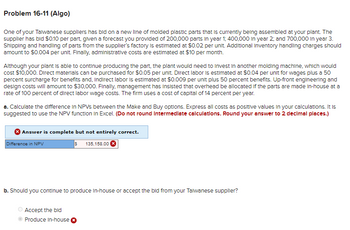One of your Taiwanese suppliers has bid on a new line of molded plastic parts that is currently being assembled at your plant. The supplier has bid $0.10 per part, given a forecast you provided of 200,000 parts in year 1; 400,000 in year 2; and 700,000 in year 3. Shipping and handling of parts from the supplier's factory is estimated at $0.02 per unit. Additional inventory handling charges should amount to $0.004 per unit. Finally, administrative costs are estimated at $10 per month. Although your plant is able to continue producing the part, the plant would need to invest in another molding machine, which would cost $10,000. Direct materials can be purchased for $0.05 per unit. Direct labor is estimated at $0.04 per unit for wages plus a 50 percent surcharge for benefits and, indirect labor is estimated at $0.009 per unit plus 50 percent benefits. Up-front engineering and design costs will amount to $30,000. Finally, management has insisted that overhead be allocated if the parts are made in-house at a rate of 100 percent of direct labor wage costs. The firm uses a cost of capital of 14 percent per year. a. Calculate the difference in NPVs between the Make and Buy options. Express all costs as positive values in your calculations. It is suggested to use the NPV function in Excel. (Do not round intermediate calculations. Round your answer to 2 decimal places.) Difference in NPV b. Should you continue to produce in-house or accept the bid from your Taiwanese supplier?
One of your Taiwanese suppliers has bid on a new line of molded plastic parts that is currently being assembled at your plant. The supplier has bid $0.10 per part, given a forecast you provided of 200,000 parts in year 1; 400,000 in year 2; and 700,000 in year 3. Shipping and handling of parts from the supplier's factory is estimated at $0.02 per unit. Additional inventory handling charges should amount to $0.004 per unit. Finally, administrative costs are estimated at $10 per month. Although your plant is able to continue producing the part, the plant would need to invest in another molding machine, which would cost $10,000. Direct materials can be purchased for $0.05 per unit. Direct labor is estimated at $0.04 per unit for wages plus a 50 percent surcharge for benefits and, indirect labor is estimated at $0.009 per unit plus 50 percent benefits. Up-front engineering and design costs will amount to $30,000. Finally, management has insisted that overhead be allocated if the parts are made in-house at a rate of 100 percent of direct labor wage costs. The firm uses a cost of capital of 14 percent per year. a. Calculate the difference in NPVs between the Make and Buy options. Express all costs as positive values in your calculations. It is suggested to use the NPV function in Excel. (Do not round intermediate calculations. Round your answer to 2 decimal places.) Difference in NPV b. Should you continue to produce in-house or accept the bid from your Taiwanese supplier?
Managerial Accounting
15th Edition
ISBN:9781337912020
Author:Carl Warren, Ph.d. Cma William B. Tayler
Publisher:Carl Warren, Ph.d. Cma William B. Tayler
Chapter11: Differential Analysis And Product Pricing
Section: Chapter Questions
Problem 14E: Accepting business at a special price Box Elder Power Company expects to operate at 85% of...
Related questions
Question

Transcribed Image Text:Problem 16-11 (Algo)
One of your Taiwanese suppliers has bid on a new line of molded plastic parts that is currently being assembled at your plant. The
supplier has bid $0.10 per part, given a forecast you provided of 200,000 parts in year 1; 400,000 in year 2; and 700,000 in year 3.
Shipping and handling of parts from the supplier's factory is estimated at $0.02 per unit. Additional inventory handling charges should
amount to $0.004 per unit. Finally, administrative costs are estimated at $10 per month.
Although your plant is able to continue producing the part, the plant would need to invest in another molding machine, which would
cost $10,000. Direct materials can be purchased for $0.05 per unit. Direct labor is estimated at $0.04 per unit for wages plus a 50
percent surcharge for benefits and, indirect labor is estimated at $0.009 per unit plus 50 percent benefits. Up-front engineering and
design costs will amount to $30,000. Finally, management has insisted that overhead be allocated if the parts are made in-house at a
rate of 100 percent of direct labor wage costs. The firm uses a cost of capital of 14 percent per year.
a. Calculate the difference in NPVs between the Make and Buy options. Express all costs as positive values in your calculations. It is
suggested to use the NPV function in Excel. (Do not round intermediate calculations. Round your answer to 2 decimal places.)
Difference in NPV
b. Should you continue to produce in-house or accept the bid from your Taiwanese supplier?
Accept the bid
O Produce in-house
Expert Solution
This question has been solved!
Explore an expertly crafted, step-by-step solution for a thorough understanding of key concepts.
Step by step
Solved in 3 steps with 2 images

Follow-up Questions
Read through expert solutions to related follow-up questions below.
Follow-up Question

Transcribed Image Text:Problem 16-11 (Algo)
One of your Taiwanese suppliers has bid on a new line of molded plastic parts that is currently being assembled at your plant. The
supplier has bid $0.10 per part, given a forecast you provided of 200,000 parts in year 1; 400,000 in year 2; and 700,000 in year 3.
Shipping and handling of parts from the supplier's factory is estimated at $0.02 per unit. Additional Inventory handling charges should
amount to $0.004 per unit. Finally, administrative costs are estimated at $10 per month.
Although your plant is able to continue producing the part, the plant would need to invest in another molding machine, which would
cost $10,000. Direct materials can be purchased for $0.05 per unit. Direct labor is estimated at $0.04 per unit for wages plus a 50
percent surcharge for benefits and, Indirect labor is estimated at $0.009 per unit plus 50 percent benefits. Up-front engineering and
design costs will amount to $30,000. Finally, management has insisted that overhead be allocated if the parts are made in-house at a
rate of 100 percent of direct labor wage costs. The firm uses a cost of capital of 14 percent per year.
a. Calculate the difference in NPVs between the Make and Buy options. Express all costs as positive values in your calculations. It is
suggested to use the NPV function in Excel. (Do not round Intermediate calculations. Round your answer to 2 decimal places.)
Answer is complete but not entirely correct.
$ 135,158.00
Difference in NPV
b. Should you continue to produce in-house or accept the bid from your Taiwanese supplier?
Accept the bld
Produce In-house
Solution
Knowledge Booster
Learn more about
Need a deep-dive on the concept behind this application? Look no further. Learn more about this topic, finance and related others by exploring similar questions and additional content below.Recommended textbooks for you

Managerial Accounting
Accounting
ISBN:
9781337912020
Author:
Carl Warren, Ph.d. Cma William B. Tayler
Publisher:
South-Western College Pub


Managerial Accounting
Accounting
ISBN:
9781337912020
Author:
Carl Warren, Ph.d. Cma William B. Tayler
Publisher:
South-Western College Pub
